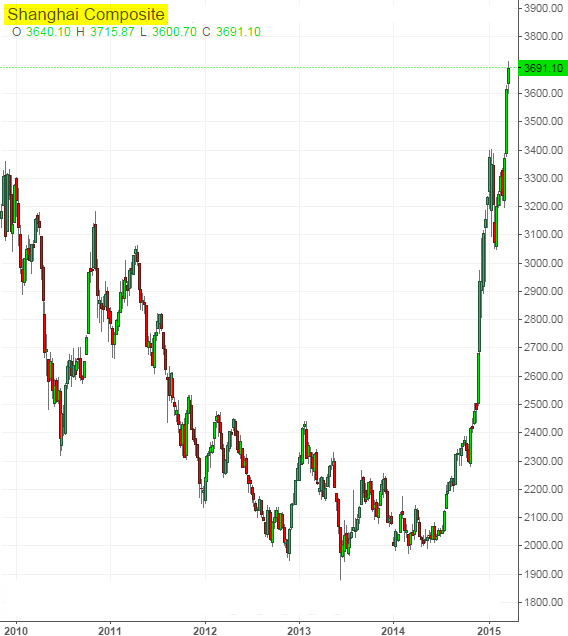The recent one year has been a spectacular gain for the rising dragon of the China Shanghai composite market. In less than a year period, the index has risen from the low of 1900 to a high of 3700. This is despite the soft landing issues China's economy has been suffering that we hear all years long. There's only one explanation that leads to this outcome: Speculation.
Interestingly, a giant pool of money has recently flowed to the HK market, spilling some contagion of euphoria into the HKSE index, which has seen over 1000+ points increase since the quota was introduced earlier in the week. It has been a spectacular show to watch for me this week, as we've seen the bull taking rage of the whole market this week.
The euphoria doesn't spill over to our STI index, though one of my core holdings from China Merchant Pacific (CMP) has profited from this run.
Some interesting things to take note is the existing vs new investors highest level of education attained tracked by Bloomberg.
According to the research, the existing investors level of education in the market are fairly spread well across all spectrum. However, the recent new investors coming into the market are mostly consisting of investors from the bottom spectrum of the education level that made up of mostly Junior High School and Elementary School. You can infer a few deductions from this. The most obvious is of course the level of speculation that these people might be engaged in. The argument arises because these people are the most likely not engaged in fundamental analysis and are likely to go for short term gains. There may be some truth in it, but we can also argue it the other way.
For instance, the level of education attained might not be a representative of deciding whether there are more investing or speculation. There are some with lower education who are proficient in investing because he or she has been in the market for a longer time or perhaps one can educate through reading and learning on their own.
Perhaps, it could be useful if they can track the age or even the profession of the investors. That would make a better choice for our own speculation purpose.
Will A Correction Takes Place?
While the market is surging higher, it is important to monitor on our stock's valuation to make sure they do not stretch to such extent that price has been going up much faster than earnings or fundamentals.
When the fundamentals of the company isn't doing so good, selling them in the midst of the bull market seems a logical way to divest and take profits. However, when the fundamentals of the company is great, that will form a bigger dilemma of whether selling should even be considered.
Last but not least, I just wanted to share a sequence of bear case scenario that happened in the US market in the last 70 years. A bear market is defined as a 20% drop in the stock market from the recent high.
It should be clear that bull runs do not go up in a straight line. There's a natural ebb and flow to the stock market that everyone should understand. In fact, contrary to popular beliefs, a bear market happens more frequently than they appear. That does not mean that one should time the market, but it is more important to look and make sure that we do not get lured into the party and forget to leave them. Even when we do, make sure those underwear you wore are still intact.




